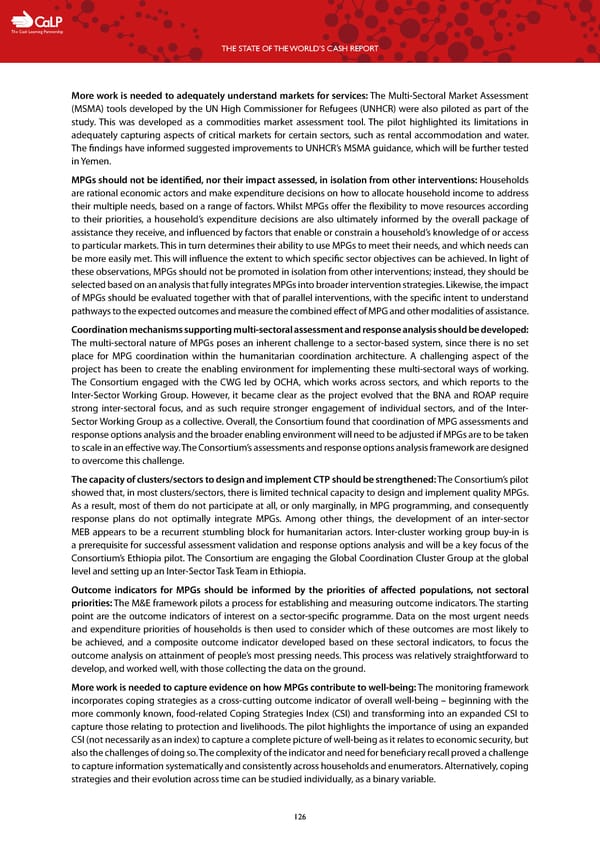C The Cash Learning Partnership THE STATE OF THE WORLD’S CASH REPORT More work is needed to adequately understand markets for services: The Multi-Sectoral Market Assessment (MSMA) tools developed by the UN High Commissioner for Refugees (UNHCR) were also piloted as part of the study. This was developed as a commodities market assessment tool. The pilot highlighted its limitations in adequately capturing aspects of critical markets for certain sectors, such as rental accommodation and water. The findings have informed suggested improvements to UNHCR’s MSMA guidance, which will be further tested in Yemen. MPGs should not be identified, nor their impact assessed, in isolation from other interventions: Households are rational economic actors and make expenditure decisions on how to allocate household income to address their multiple needs, based on a range of factors. Whilst MPGs offer the flexibility to move resources according to their priorities, a household’s expenditure decisions are also ultimately informed by the overall package of assistance they receive, and influenced by factors that enable or constrain a household’s knowledge of or access to particular markets. This in turn determines their ability to use MPGs to meet their needs, and which needs can be more easily met. This will influence the extent to which specific sector objectives can be achieved. In light of these observations, MPGs should not be promoted in isolation from other interventions; instead, they should be selected based on an analysis that fully integrates MPGs into broader intervention strategies. Likewise, the impact of MPGs should be evaluated together with that of parallel interventions, with the specific intent to understand pathways to the expected outcomes and measure the combined effect of MPG and other modalities of assistance. Coordination mechanisms supporting multi-sectoral assessment and response analysis should be developed: The multi-sectoral nature of MPGs poses an inherent challenge to a sector-based system, since there is no set place for MPG coordination within the humanitarian coordination architecture. A challenging aspect of the project has been to create the enabling environment for implementing these multi-sectoral ways of working. The Consortium engaged with the CWG led by OCHA, which works across sectors, and which reports to the Inter-Sector Working Group. However, it became clear as the project evolved that the BNA and ROAP require strong inter-sectoral focus, and as such require stronger engagement of individual sectors, and of the Inter- Sector Working Group as a collective. Overall, the Consortium found that coordination of MPG assessments and response options analysis and the broader enabling environment will need to be adjusted if MPGs are to be taken to scale in an effective way. The Consortium’s assessments and response options analysis framework are designed to overcome this challenge. The capacity of clusters/sectors to design and implement CTP should be strengthened: The Consortium’s pilot showed that, in most clusters/sectors, there is limited technical capacity to design and implement quality MPGs. As a result, most of them do not participate at all, or only marginally, in MPG programming, and consequently response plans do not optimally integrate MPGs. Among other things, the development of an inter-sector MEB appears to be a recurrent stumbling block for humanitarian actors. Inter-cluster working group buy-in is a prerequisite for successful assessment validation and response options analysis and will be a key focus of the Consortium’s Ethiopia pilot. The Consortium are engaging the Global Coordination Cluster Group at the global level and setting up an Inter-Sector Task Team in Ethiopia. Outcome indicators for MPGs should be informed by the priorities of affected populations, not sectoral priorities: The M&E framework pilots a process for establishing and measuring outcome indicators. The starting point are the outcome indicators of interest on a sector-specific programme. Data on the most urgent needs and expenditure priorities of households is then used to consider which of these outcomes are most likely to be achieved, and a composite outcome indicator developed based on these sectoral indicators, to focus the outcome analysis on attainment of people’s most pressing needs. This process was relatively straightforward to develop, and worked well, with those collecting the data on the ground. More work is needed to capture evidence on how MPGs contribute to well-being: The monitoring framework incorporates coping strategies as a cross-cutting outcome indicator of overall well-being – beginning with the more commonly known, food-related Coping Strategies Index (CSI) and transforming into an expanded CSI to capture those relating to protection and livelihoods. The pilot highlights the importance of using an expanded CSI (not necessarily as an index) to capture a complete picture of well-being as it relates to economic security, but also the challenges of doing so. The complexity of the indicator and need for beneficiary recall proved a challenge to capture information systematically and consistently across households and enumerators. Alternatively, coping strategies and their evolution across time can be studied individually, as a binary variable. 126
 The State of the World's Cash | Full Report Page 127 Page 129
The State of the World's Cash | Full Report Page 127 Page 129